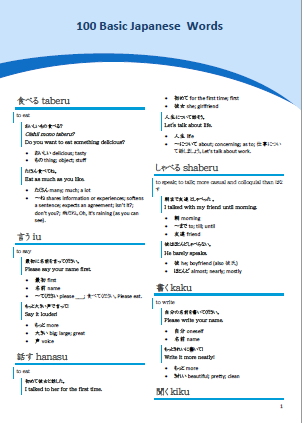5 May 2020
Japanese Greetings and Goodbyes: The Ultimate Guide
(This article was reviewed and edited by native Japanese speakers to ensure accuracy.)
Parents in Japan often tell their children that あいさつは大事! or greetings are important! From a young age, it is essential to be polite and considerate in Japanese society. This is also reflected in the way that greetings and goodbyes have different forms based on formality. Furthermore, there are many Japanese words that don’t translate directly into English. Hopefully, this guide can make it easier to navigate different situations so that you can feel confident about Japanese greetings and goodbyes!
How Do You Say “Hello” in Japanese?
こんにちは – Konnichiwa
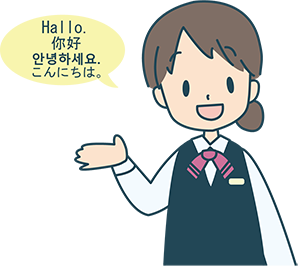
This might be one of the first words we learn when we begin our journey in understanding the Japanese language. However, did you know that こんにちは does not always work the same way as “hello”? It is actually necessary to be a bit more conscious of when to use it, in order to speak in a natural way.
こんにちは is an extremely time-sensitive greeting. In fact, the only time you should use it is when it is neither morning nor evening. It’s also important to use a greeting with an awareness of time when writing messages to other people, unless you don’t know when that person will be reading it.
This greeting is usually not used with certain friends and family members as it’s too formal and polite. Some people may use it with their friends.
Here are a few examples where we should not use it:
- Hello John! Do you want to go for dinner now?
- Hello Akane, I’m about to go for a morning jog!
Here is the correct time to use it:
Hello everyone, I would like to start this afternoon meeting.
みなさん、こんにちは。午後の会議を始めようと思います。
Minasan, konnichiwa. Gogo no kaigi o hajimeyou to omoimasu.
Informal “Hello”
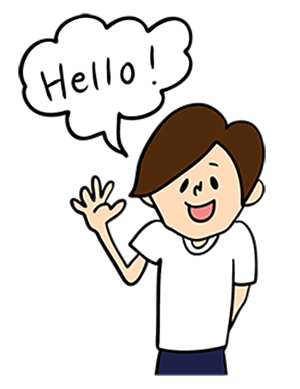

In informal occasions, it’s possible to use some expressions in the same way as we would in English. These can all be interchanged with each other and there is no importance on the time it is used.
Only use these when the person you are talking to is family, some friends, the same age, or younger. Otherwise, wait until they allow you to start talking to them informally.
- よぉ – Yoo: A similar feeling to “hey!’ or “Yo” in English.
- ハロー – Haroo: This is “hello” as a borrowed English word. Words in English are considered “cool” or “cute” so some people might choose to use this greeting.
- おっす – Ossu: This greeting is normally used between young men and has a manly vibe to it. It may have originated from the greetings used in martial arts.
- ヤッホー – Yahhoo: The origin of this one is a bit mysterious but it might have some English origin to it. It has a nuance of getting someone’s attention or calling someone over. This expression is primarily used by young people.
- どうも – Doumo: This one is a bit more complex because the meaning of the word can be quite different depending on the context. However, there are cases where it is sometimes used informally as more of a “hello”. Even though this is considered informal, it can also be a reasonably polite expression, so you may use it with your boss or people who have a higher status.
There are more informal greetings than on this list, and these tend to be the slang used by the younger generation. Be on the lookout for new words that will likely pop up!
“Hello” on the Phone
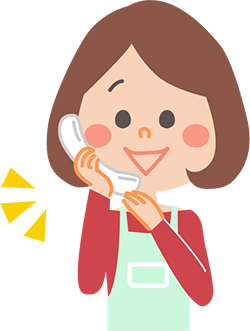

In Japanese, there are different ways of greeting on the phone than face to face or written greetings. The way we greet differs based on the formality of the phone call. Here are the two types:
Informal: もしもし- Moshi moshi
It’s said that this word comes from the word, 申す、which means “to say”. Like the “hello” in English phone calls it is also used when we can’t hear the other person.
もしもし、聞こえる?電波が悪いみたいだね。
Moshimoshi, kikoeru? Denpa ga warui mitai da ne.
Hello? Can you hear me? I think the phone connection is bad.
もしもし、お母さん?今日の夜ご飯どうする?
Moshimoshi, okaasan? Kyou no yoru gohan dou suru?
Hello, Mom? What should we do for dinner?
もしもし isn’t appropriate in business situations.
Formal: はい、(your name)です。
In more formal, business or work-related situations, it is more common to answer the phone with はい, or yes, followed by your name.
はい、山本です。
Hai, Yamamoto desu.
Yes (Hello), this is Yamamoto speaking.
Formal: お電話ありがとうございます。
If you are receiving calls from your customers, it is common to say お電話ありがとうございます or thank you for calling.
お電話ありがとうございます。アップルストア渋谷店です。
Odenwa arigatou gozaimasu, Appuru sutoa shibuyaten desu.
Thank you for calling, this is the Shibuya branch of the Apple store.
Other “Hello’s”


お疲れ様です – Otsukaresama desu (formal) and お疲れ – Otsukare (informal)
This is a unique Japanese phrase that is used during all times of the day, especially in business situations. It can be both a greeting and a farewell. it is usually acknowledging your coworker, teammate, or anyone you might be working together with, for their hard work. For example, if you are working as a server at a restaurant and you need to greet your coworker who just finished their shift, you might say:
お疲れ様です!今日はどうでしたか?
Otsukaresama desu! Kyou wa dou deshita ka?
I appreciate your work! How was it today?
Time Sensitive Greetings
Good Morning


There are a few different ways to say “good morning” based on formality. In general, it should be used from sunrise to sometime before 10am. But people have different opinions about when you should stop saying おはようございます.
Formal: おはようございます – Ohayou gozaimasu
This is the most formal way of saying “good morning” and can be used with strangers, those older than you, and anyone you want to greet with respect. In certain industries, such as music and television, where they tend to work and sleep late, they sometimes use this greeting at all hours of the day!
先生、おはようございます。
Sensei, Ohayougozaimasu.
Good morning, teacher.
Informal: おはよう – Ohayou
Without ございます, this is the more informal version that you can use with some friends and family.
お兄ちゃん、おはよう!
Oniichan, ohayou!
Good morning, brother!
Good Afternoon


In Japanese, there is no real phrase like “good afternoon”. The right word would be こんにちは- Konnichiwa. As discussed earlier, although こんにちは is often translated as “hello”, it is used in a more time-sensitive context similar to “good afternoon”. It should be used between 11am to 5pm or sunset. Again, people have different opinions about exactly when you should say こんにちは. (See the previous section on こんにちは for example sentences)
There’s no informal version of こんにちは. Some people may still use it with their friends.
Good Evening


For “good evening”, there is only one word, こんばんは – Konbanwa, which is generally used after around 5pm or sunset.
There’s no informal/casual version of こんばんは. Some people may still use it with their friends.
山本さん、こんばんは。月がきれいですね。
Yamamoto-san, konbanwa. Tsuki ga kirei desu ne.
Mr. Yamamoto, good evening. The moon tonight is pretty.
Other Common Greetings!
Long Time No See!


Like many of the other greetings, “long time no see” can also be said in several ways depending on the level of formality. All of these greetings can also mean “it has been a while”.
Formal: お久しぶりです – Ohisashiburi desu
This greeting is in the formal form and can be used in any situation where the other person needs to be addressed with respect. If you’ve graduated from college and bump into your high school teacher you might say:
先生、お久しぶりです。
Sensei, ohisashiburi desu.
Teacher, long time no see!
Informal: 久しぶり- Hisashiburi
This is the informal form of お久しぶりです which can be used with friends and family.
メグミちゃん、久しぶり!アメリカ留学どうだった?
Megumi-chan, hisashiburi! America ryugaku dou datta?
Megumi, long time no see! How was your study abroad in the US?
Formal: ご無沙汰しています- Gobusata shiteimasu
This may sound like a rather formal phrase but it’s quite common for people say in person. It’s also common in written Japanese.
ご無沙汰しています。返事が遅れてすみません。
Gobusata shite imasu. Henji ga okurete sumimasen.
It has been a while. I’m sorry for the late reply.
How Are You?


In the Japanese language, “how are you?” does not work quite the same way as in English. In general, the phrase should only be used when you haven’t seen the other person for some time.
Here are some common English situations where it does not translate to Japanese.
- At the cash register, ticket counter, or any other situation where you don’t know or never met the other person.
- If you see the person every day.
- To someone who seems to have a grave illness or who wouldn’t feel comfortable answering with an honest response.
- As a casual greeting, replacing “hello”.
There are two ways of saying “how are you?” with different degrees of formality. It is also commonly preceded by “long time no see”.
Formal: お元気ですか?- Ogenkidesuka
The word 元気 means “energy” or “health”. It literally translates to “do you have energy?” or “are you healthy?”. However, it is more like the phrase, “how have you been?”. お元気ですか?should be used in formal contexts.
山田さん、お久しぶりです!お元気ですか?
Yamada-san, ohisashiburi desu! Ogenki desuka?
Mr. Yamada, long time no see! How have you been?
Informal: 元気?- Genki?
This is the informal version of お元気ですか?It can be used casually with friends and family.
めぐみちゃん、久しぶり! 元気?
Megumi-chan, hisashiburi! Genki?
Megumi, long time no see! How have ya been?
In both cases, notice how the “long time no see” phrase which commonly precedes “How are you?”, matches in the level of formality. お久しぶり goes with お元気ですか?and 久しぶり goes with 元気?
“Nice to Meet You!” and Introducing Yourself
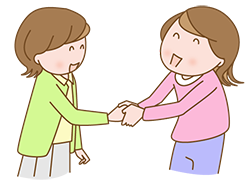

Formal: 初めまして- Hajimemashite
In Japanese, it’s common to use the formal form until it is clear where the person lies, in terms of social hierarchy. When you first meet, if there is any doubt about the level of formality make sure to use the phrase, 初めまして- Hajimemashite. It’s usually followed by saying your name.
初めまして、クリスティーナです。
Hajimemashite, kurisutiina desu.
Nice to meet you! I’m Christina.
始めまして sounds quite formal so in a more cassual situation, you may use other expressions like どうも。
どうも、クリスティーナです。
Doumo, kurisutina desu.
Hi, I’m Christina.
Keep in mind that 初めまして does not directly translate to “nice to meet you” in every situation. In English, it is common to say “nice to meet you” or “nice meeting you” at the end of your introduction. In Japanese, this phrase can only be used at the beginning. Instead, here are some ways to wrap up the introduction.
Formal: よろしくお願いします – Yoroshiku onegaishimasu
This translates to something like “please take care of me in the future”. Although it may seem a bit strange in English, it is common in Japan to say this to someone you meet for the first time. This is the formal version of the phrase.
初めまして、渡辺けいこです。よろしくお願いします。
Hajimemashite, watanabe keiko desu. Yoroshiku onegaishimasu.
Nice to meet you, I’m Keiko Watanabe. Please take care of me in the future.
In business situations, it is also common to use 以上よろしくお願いいたします at the ends of emails. In this situation, it would mean something like “please take care of the above”, and you would say:
以上よろしくお願いいたします。
Ijou yoroshiku onegai itashimasu.
Please take care of the above.
Informal: よろしく – Yoroshiku
This is the informal version of どうぞよろしくお願いします. If you’ve already figured out whether the person you just met is of an equal or lower social hierarchy (they could be the same age, younger, or a peer in school), you can already start using the informal form!
初めまして!じゅんこだよ。よろしく!
Hajimemashite! Junko da yo. Yoroshiku!
Nice to meet you! I’m Junko. Please take care of me in the future!
Time to Say “Goodbye”
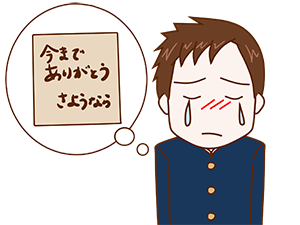

The common word that is usually learned for “goodbye” is さようなら- Sayonara. However, it is not accurate to translate “goodbye” to さようなら. It is most often used when you probably won’t see the other person for a while.
Alternatively, in Japanese schools, it is common for students to say さようなら to their teachers. This word can be used in both formal and informal contexts. Here are some examples:
Formal: If you’re saying goodbye to an older coworker who is moving abroad to a new job, you might say:
さようなら。またいつかお会いできるのが楽しみです!
Sayonara. Mata itsuka oai dekirunoga tanoshimi desu!
Goodbye, I’m looking forward to meeting you again sometime.
Informal: If you’re saying goodbye to a friend who is moving back to their hometown in another country, you might say:
さようなら。元気でね!また会えるといいね。
Sayonara. Genki de ne! Mata aeruto iine.
Good bye. Stay well! Hope we can meet again!
Common Ways to Leave a Conversation or Location


Instead of さようなら, it is actually more common to use certain phrases to leave a location or conversation.
Formal: 失礼します – Shitsurei shimasu
This is a formal way to leave a conversation or location. It’s especially common in business situations. It translates to something like “please excuse me”. It is quite common to say this as a way to leave.
失礼いたします is a slightly more polite version. It is also common to use 失礼いたします when you end a phone conversation in a business situation.
今日はもう遅いので、失礼します。
Kyou wa mou osoi no de, shitsurei shimasu.
It’s already late today so please excuse me.
Formal: お邪魔しました – Ojama shimashita
This can be used when you are leaving someone’s house. It can translate to something like “I have bothered you” but actually means more like a “thank you for having me”. It shows respect for being allowed inside someone else’s home.
夜ご飯美味しかったです!お邪魔しました。
Yorugohan oishikatta desu! Ojama shimashita.
The dinner was delicious! Thank you for having me.
Even though this one is formal, a lot of people use it when they leave their close friends’ house because there’s no informal version.
Formal: お疲れ様でした – Otsukaresama deshita
As discussed earlier, this phrase–which can also be a greeting–is a common parting phrase. It can be used when you are leaving work, sports practice, or some kind of activity that uses effort and energy.
When it means “goodbye”, it can mean something like “thank you for your hard work”.
今日のイベント大成功でしたね。お疲れ様でした!
Kyou no ibento daiseikou deshita ne. Otsukaresama deshita!
Today’s event was a huge success. Thank you for your hard work!
Informal: お疲れ – Otsukare
This is the informal version of お疲れ様でした. For example, if you finished playing a soccer match, you could tell your teammate:
今日の試合は負けたけど、いいせんいったね!お疲れ!
Kyou no shiai wa maketa kedo, iisen itta ne! Otsukare!
We lost today’s match, but it was pretty close! Thank you for your hard work!
Formal: お先に失礼します – Osaki ni shitsurei shimasu
This is a formal phrase used if you’re leaving earlier than others. For example, maybe your co-workers are still at the office but you have finished your work. It can mean something like “please excuse me early”.
子供を迎えに行かないといけないので、今日はお先に失礼します!
Kodomo o mukae ni ikanaito ikenainode, kyou wa osaki ni shitsurei shimasu!
I have to pick up my kids today, so please excuse me early!
Informal: お先に – Osaki ni
This is the informal version of お先に失礼します. If you’re studying with some classmates but need to leave early, you might say:
ごめん、今日はもう家に帰らないと!お先に!
Gomen, kyou wa mou uchi ni kaeranai to! Osaki ni!
Sorry, today I have to head home now. Excuse me early!
Casual and Other Goodbyes


Like the “hello”, there are numerous casual ways of saying “goodbye”. These you can use with friends and family! Here are a some examples:
- またね – Matane: This is like a “see ya!’ in English. This word can be used when you think you’ll probably see this person again.
- じゃーね – Jaa ne: This one translates to mean something like “bye”. It sounds very casual.
- バイバイ- Baibai: This is a English borrowed word from “Bye Bye”. Since English feels more trendy, this way of saying “goodbye” can seem more cool!
- また明日! – Mata ashita: This means “see you tomorrow!” and is also a very casual parting phrase.
Good Night
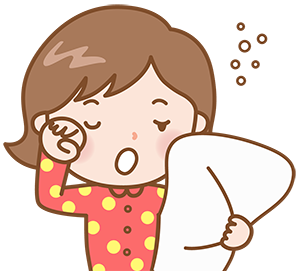

If someone is going off to sleep you can say おやすみなさい – Oyasuminasai (formal) or.
Formal: おやすみなさい – Oyasuminasai
If you are on a business trip with your superior (Mr. Murayama) you might say at the end of the day:
村山さん、おやすみなさい!
Murayama-san, oyasuminasai!
Mr. Murayama, good night!
Informal: おやすみ – Oyasumi
If you’re sleeping over at your friend’s (Kazuma’s) place you might say:
カズマくん、おやすみ!
Kazuma-kun, oyasumi!
Kazuma, good night!
Body Language and More Tips
As in all languages, body language can be just as meaningful in Japanese as the words themselves. When greeting and saying goodbye, here are a few final tips:
- It is common to lower the head instead of a handshake or hug. Generally, Japanese people will nod slightly for informal situations and bow a bit deeper for more formal greetings and goodbyes.
- Waving the hand to signal “goodbye” and “hello” can also be common among friends and family.
- It’s also important to be aware of your social position and to not greet everyone by their first name. It’s generally safer to use the last name to greet and say farewells to those who are older and more established than you.
I hope that this guide has been helpful in figuring out the complexities of greetings and goodbyes in the Japanese language. Since many of these concepts are different from the way it works in English, it may take some time and real-life situations to achieve a solid understanding. You may even discover some new ways to say “hello” and “goodbye” with time and experience! Good luck and がんばれ!
